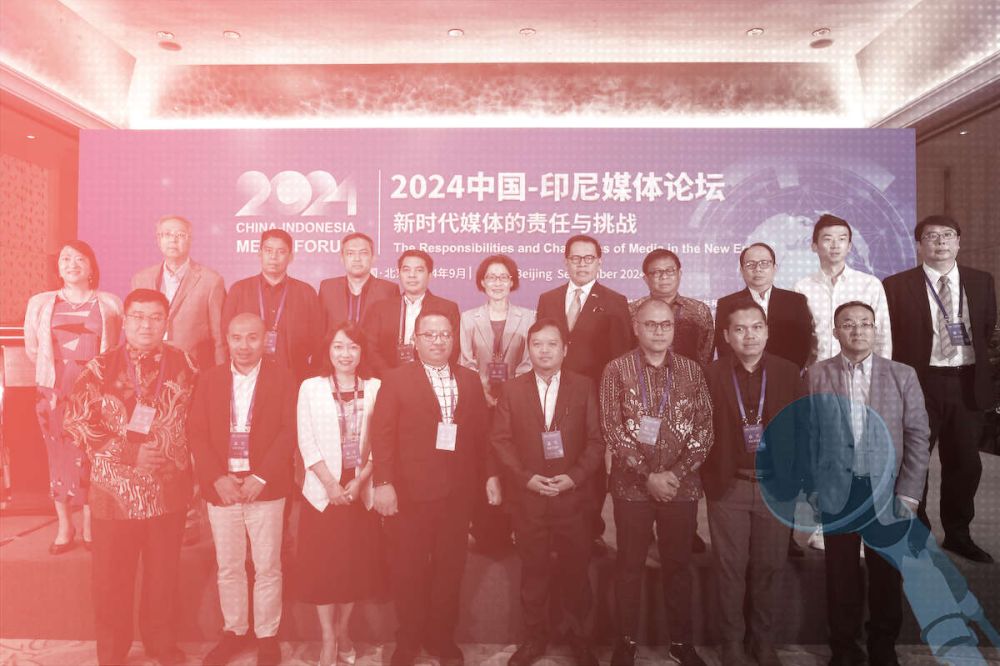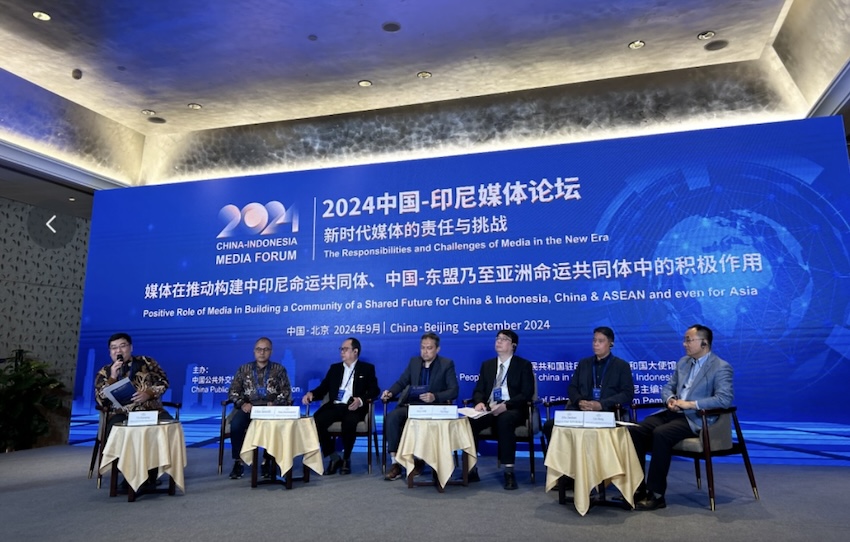
Over the weekend, media representatives from Indonesia gathered with their Chinese counterparts at a forum in Beijing to discuss “friendship” and cooperation — a further sign of China’s concerted media diplomacy push across Southeast Asia to encourage trade and investment, and shape public perceptions of its regional role.
The September 1 event, the second annual China-Indonesia Media Forum (中国-印尼媒体论坛), was attended by scores of mainstream media from both countries, according to a report from the official Xinhua News Agency, as well as think-tanks and state officials.
Participants on the Indonesia side included the country’s Antara National News Agency, a key event partner, as well as Kumparan, a digital news platform launched in 2017; the national daily newspaper Republika (which went fully online in 2022); the Jakarta Post (雅加达邮报), a daily English-language newspaper; the private television network RCTI (Rajawali Citra Televisi Indonesia); the free-to-air private television broadcaster NET; and the online news outlet Merdeka (which in Indonesian means “independent”).
An Alliance of Positivity
According to a report from China Daily, an outlet directly under the Information Office of China’s State Council, the meeting focused on “the media’s positive role in building a community with a shared future for China and Indonesia.” This reference to a central Chinese Communist Party (CCP) buzzword in foreign relations, closely associated with General Secretary Xi Jinping, underscored the largely diplomatic nature of the event, which combined talk of bilateral “friendship” with discussions of larger media trends and media technology developments.
The event was also attended by Indonesia’s ambassador to China, Djauhari Oratmangun, who said, according to a report in the Indonesian weekly magazine Tempo, that both sides should “step up cooperation in news production and journalistic content, including by inviting journalists to report on positive aspects of each respective country.” Djauhari’s sentiment dovetailed closely with official reports in Chinese state media, which emphasized the need for media on both sides to create a public opinion environment conducive to “[promoting] relations between the two countries to scale new heights.”

Addressing the event, the editor-in-chief of Indonesia’s Antara National News Agency, Irfan Junaidi (伊爾凡·朱奈迪), said the demand for China news in Indonesia is growing rapidly. In the Xinhua version of events, he echoed official Chinese talking points, and was quoted as saying that “Chinese news and Chinese stories are important to promoting friendship and cooperation.”
By contrast, a report in Shangbao Indonesia (印度尼西亚商报), a daily Chinese-language paper on finance and business, conveyed hints in Irfan’s remarks of ambivalence in Indonesian views on China. “The people of Indonesia are extremely interested in science and technology news from China, and this sort of cooperation will also help to correct misunderstandings in Indonesia about China,” it quoted the editor-in-chief as saying. “We must admit that, to this day, not all Indonesians have a positive view of China.”
Behind the Stage
One key partner in the event, cooperating with Indonesia’s Antara, was the Academy of Contemporary China and World Studies (当代中国与世界研究院), or ACCWS, which identifies itself as “a state-level think tank specializing in the study of international communication and cooperation.” The “academy” is directly under the China International Communications Group (CICG), a state-run media conglomerate that sits under the CCP’s Central Propaganda Department and is now one of China’s chief vehicles for external propaganda and media diplomacy.
“We must admit that, to this day, not all Indonesians have a positive view of China.”
ACCWS also hosts the Global Young Leaders Dialogue (GYLD), a state mechanism to foster connections with young people internationally that is closely associated with what are generally termed “united front” tactics.
Fan Daqi, vice-president of ACCWS, said during the Beijing event that deepening cooperation between Chinese and Indonesian media in recent years has “drawn the hearts of the people in both countries closer.”
Beijing’s China-Indonesia Media Forum follows closely on the heels of a forum held in mid-July in the Indonesian capital of Jakarta. The event, “I Read China” (我读中国), was also organized by ACCWS, and brought together more than 30 participants from media, think-tanks and academia. Co-hosts of the Jakarta event included Al-Azhar University, and Sinolingua (华语教学出版社), a Beijing-based press that is 100 percent held by the propaganda department-linked CICG.




















